Related Research Articles

Ismail Kadare is an Albanian novelist, poet, essayist, screenwriter, and playwright. He is a leading international literary figure and intellectual. He focused on poetry until the publication of his first novel, The General of the Dead Army, which made him famous internationally.

Ramiz Tafë Alia was an Albanian politician serving as the second and last leader of the People's Socialist Republic of Albania from 1985 to 1991, serving as First Secretary of the Party of Labour of Albania. He was also the country's head of state from 1982 to 1992. He had been seen as a successor by Enver Hoxha and took power after Hoxha died.

Musine Kokalari was an Albanian prose writer and politician in Albania's pre-communist period. She was the founder of the Social-Democratic Party of Albania in 1943. Kokalari was one of the first published female writers of Albania. After a short involvement in politics during World War II, she was persecuted by the communist regime in Albania, and not allowed to write anymore. She died in poverty and complete isolation.
Albanian literature stretches back to the Middle Ages and comprises those literary texts and works written in Albanian. It may also refer to literature written by Albanians in Albania, Kosovo and the Albanian diaspora particularly in Italy. Albanian occupies an independent branch within the Indo-European family and does not have any other closely related language. The origin of Albanian is not entirely known, but it may be a successor of the ancient Illyrian language.

Dritëro Agolli was an Albanian poet, writer and politician. He studied in Leningrad in the Soviet Union, and wrote primarily poetry, but also short stories, essays, plays, and novels. He was head of the League of Writers and Artists of Albania from 1973 until 1992. He was a leading figure in the Albanian Communist nomenklatura.

Ilir Rexhep Meta is an Albanian politician. He served as President of Albania from 24 July 2017 to 24 July 2022.

Gjekë Marinaj is an Albanian–American poet, writer, translator and literary critic who is also known as the founder of a form of arts criticism known as Protonism Theory. Currently living in the United States, he was the first president of the Society of Albanian-American Writers, established in 2001 and has published several books of poetry, prose and literary criticism. In 2008, Marinaj was awarded the Pjetër Arbnori Prize for literature by QNK, part of the Ministry of Tourism, Cultural Affairs, Youth and Sports of Albania. In 2021, he was the recipient of South Korea's Changwon KC International Literary Prize His writing and peacemaking work have received acclaim and many other honors in Albania and elsewhere in Europe, as well as in the U.S. and Asia.
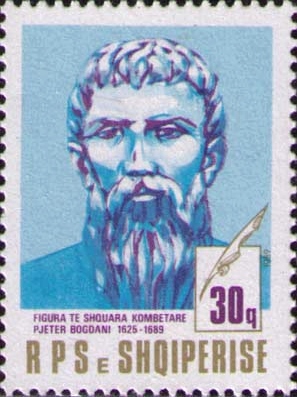
Pjetër Bogdani was the most original writer of early literature in Albania. He was author of the Cuneus Prophetarum, 1685, the first prose work of substance written originally in (Gheg) Albanian. He organized a resistance against the Ottomans and a pro-Austrian movement in Kosovo in 1689 that included Muslim and Christian Albanians.
Ervin Hatibi, Albanian poet, essayist and painter. Hatibi was born in Tirana, Albania, on May 31, 1974. At the age of 14, Hatibi published his first poems in the literary pages of the main newspapers of the epoch. His first poetry collection Përditë Shoh Qiellin, Naim Frashëri, Tirana prefaced by Ismail Kadare, was published in 1989 when he was only 15 and was widely acclaimed by the critics of the communist regime. At that time, following the sudden fame of the young author and his grooming as future national poet of the communist state, the National Film Studios of Albania "Shqiperia e Re", produced a documentary film on his works, entitled "The 15 Year Old Poet".
Avni Mula was an Albanian singer, composer, and musician. For his contribution to the arts, he received two of the highest awards from the Albanian government: the People's Artist of Albania decoration and the Honor of the Nation decoration.
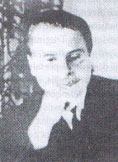
Jakov Xoxa was an author from Albania of the 20th century.
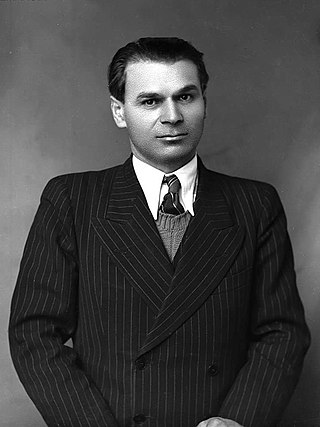
Llazar Sotir Gusho, commonly known by the pen name Lasgush Poradeci, was an Albanian philologist, poet, translator, writer and pioneer of modern Albanian literature. He is regarded as one of the most influential Albanian writers of the 20th century whose works are directly connected with Romanticism and Realism.
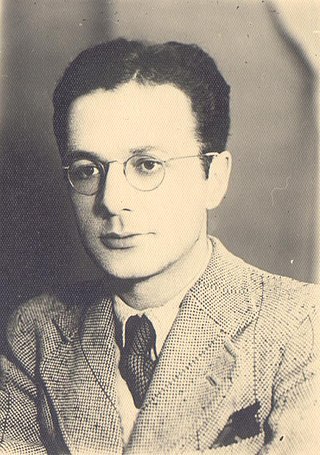
Dhimitër Shuteriqi was an Albanian scholar, literary historian, and writer. He participated in the anti-fascist National Liberation Movement. After the war he was a member of the People's Assembly and one of the founders and later president of the Albanian League of Writers and Artists. In addition to a series of books and novels, he has published numerous volumes of textbooks, especially those of the History of Albanian Literature for high schools.

The 2011 Albanian opposition demonstrations were a series of anti-government protests in cities around Albania following 18 months of political conflict over alleged electoral fraud by the opposition. A video surfaced which portrayed the deputy prime minister arranging a corrupt deal with the minister of economy. The public outcry over the video resulted in the resignation of the deputy prime minister. A demonstration was called by parliamentary opposition parties, which include the Socialist Party and the Unity for Human Rights Party. These were called on 21 January in order to protest the alleged corruption of the Albanian government as well as widespread unemployment and poverty in the country.

Ben Blushi is an Albanian politician, writer and journalist.
Drago Siliqi was an Albanian poet, literary critic, and publisher. At the age of 14 he became a scout and then a partisan of the National Liberation Movement. He published his first collection of poetry, and then pursued university studies at the Maxim Gorky Literature Institute in Moscow.

Androkli Kostallari (1922–1992) was an Albanian linguist and scholar. He was one of the central figures of the Albanian language studies and founding member and director of the Albanian Institute of History and Linguistics, and later Institute of Linguistics and Literature. Kostallari is remembered for being one of the key expert contributor to the present Albanian language orthography established by the Congress of Orthography of 1972.

The Albanian Orthography Congress was a linguistics event held in Tirana, People's Republic of Albania in 1972. It established for the first time the unified orthographic rules of the Albanian language which are still in use today.
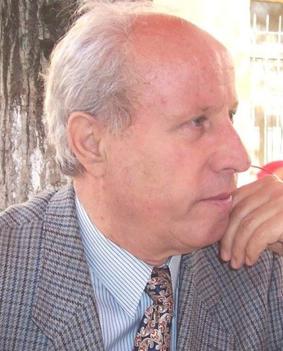
Petraq Zoto was an Albanian writer. He is mostly known for his collection of stories, and books targeting children and young readers.

Kadrush Radogoshi is an Albanian poet, novelist, play-writer, and literary critic from Kosovo. He is a dissident who opposed the revocation of the autonomy of Kosovo from the Milosevic's regime, consequently being arrested and imprisoned. Radogoshi served as President of Writers' Union of Kosovo. In 2010, he settled in Canada.
References
- 1 2 3 4 5 6 "Colossus of Albanian culture and renowned writer Naum Prifti, dead at 91". Euronews . 17 June 2023. Retrieved 21 June 2023.
- 1 2 3 "Shuhet në moshën 91-vjeçare shkrimtari Naum Prifti". Albanian Post (in Albanian). 17 June 2023. Retrieved 21 June 2023.
- ↑ Hawkesworth, Celia (1991). Writers from Eastern Europe. Book Trust. p. 11. ISBN 978-0-85353-442-6.